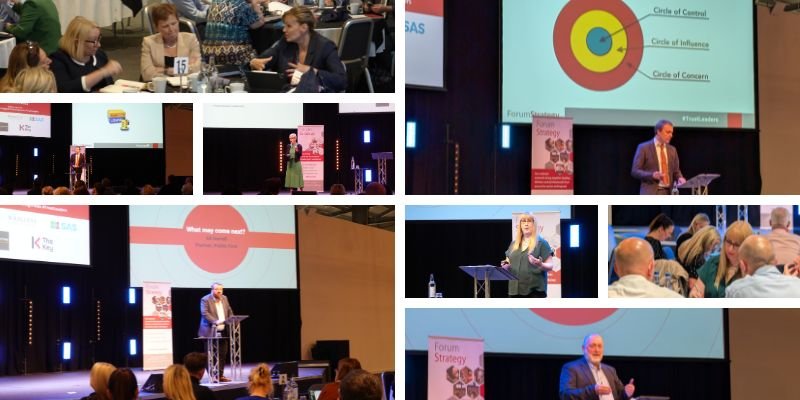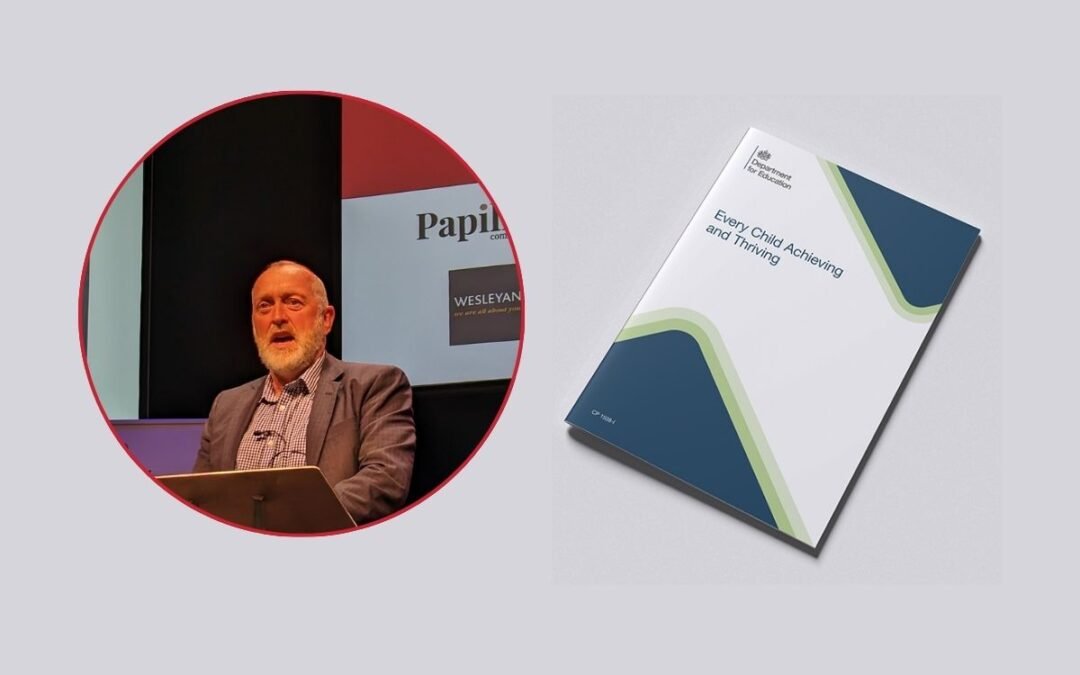One year in: navigating the change as trusts and as a sector
“In both its boldness and in its vulnerability, the power of the collective was reaffirmed.”
On 5 June 2025 we welcomed colleagues from across the country to our fourth annual National #TrustLeaders Symposium held at Trent Vineyard in Nottingham, bringing together individual members of Forum Strategy’s National CEO, COO and Education Leaders Networks.
The event was titled ‘One year in: navigating the change as trusts and as a sector’ and was led by Forum Strategy’s CEO, Alice Gregson, and our Founder and Chair, Michael Pain. The event was once again supported by Sir Steve Lancashire (Chair of our National #TrustLeaders CEO Network) and facilitated by Jane Creasy. We were also pleased to welcome Ed Dorrell, Partner at Public First and former education journalist, to reflect on what may come next for the education sector.
The symposium provided a fantastic opportunity for members of our three networks to come together to explore the changes in the education system since last year’s general election.
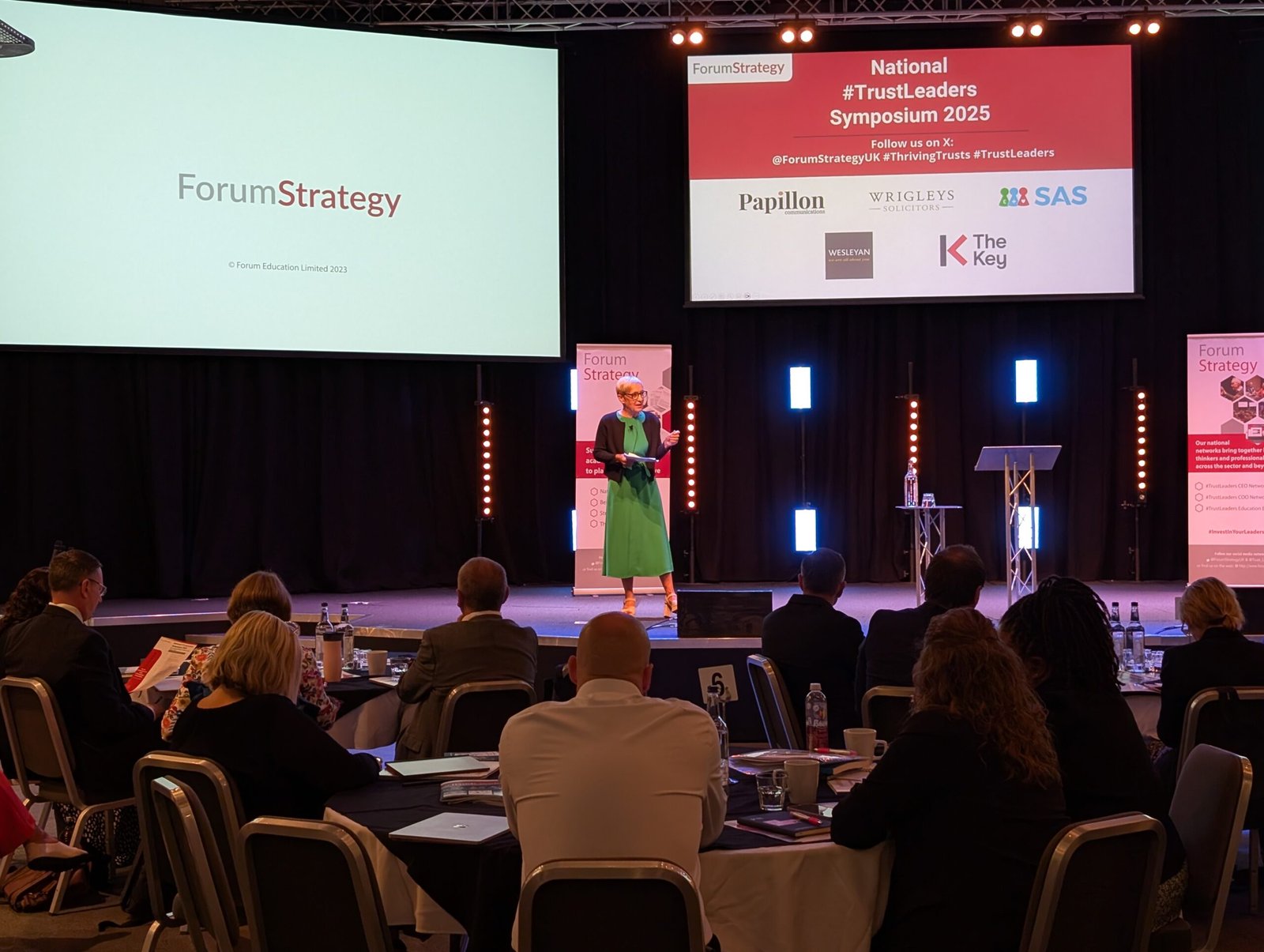
Jane welcomed colleagues to the event and thanked them for carving the time out of their busy schedules to attend what promised to be a fantastic event. One of the main aims for the Forum Strategy symposia is to provide a safe space for trust leaders to bring their expertise and ideas, and their questions and vulnerabilities, in order to learn from each other.
In this spirit of openness and collaborative learning, Jane began the day by inviting colleagues to discuss the key questions they had brought to the event, and to share what information they hoped to come away with by the end of the day.
Following these opening conversations, colleagues fed back some particular themes around the questions they were bringing to the event:
- What is the government’s vision for the education sector, and how do trusts fit into this vision?
- What are the implications of this first question for trust growth and/or ‘soft’ collaboration between trusts?
- What will be Ofsted’s definition of ‘inclusion’ in its new approach to inspection, and how will schools and trusts be measured on it?
- What will be the outcome of the Curriculum Review, and in particular how will AI feature?
- How can the system address needs around SEND and what solutions will the government put in place?
- What are others doing about safeguarding within SEND organisations; and how are they approaching the auditing of safeguarding?
On the information they wished to come away with at the end of the day, colleagues overwhelmingly commented that they wanted to end the day with renewed hope for the education system; more clarity around the policy direction for trusts and schools; and further information on some of the key issues raised above.
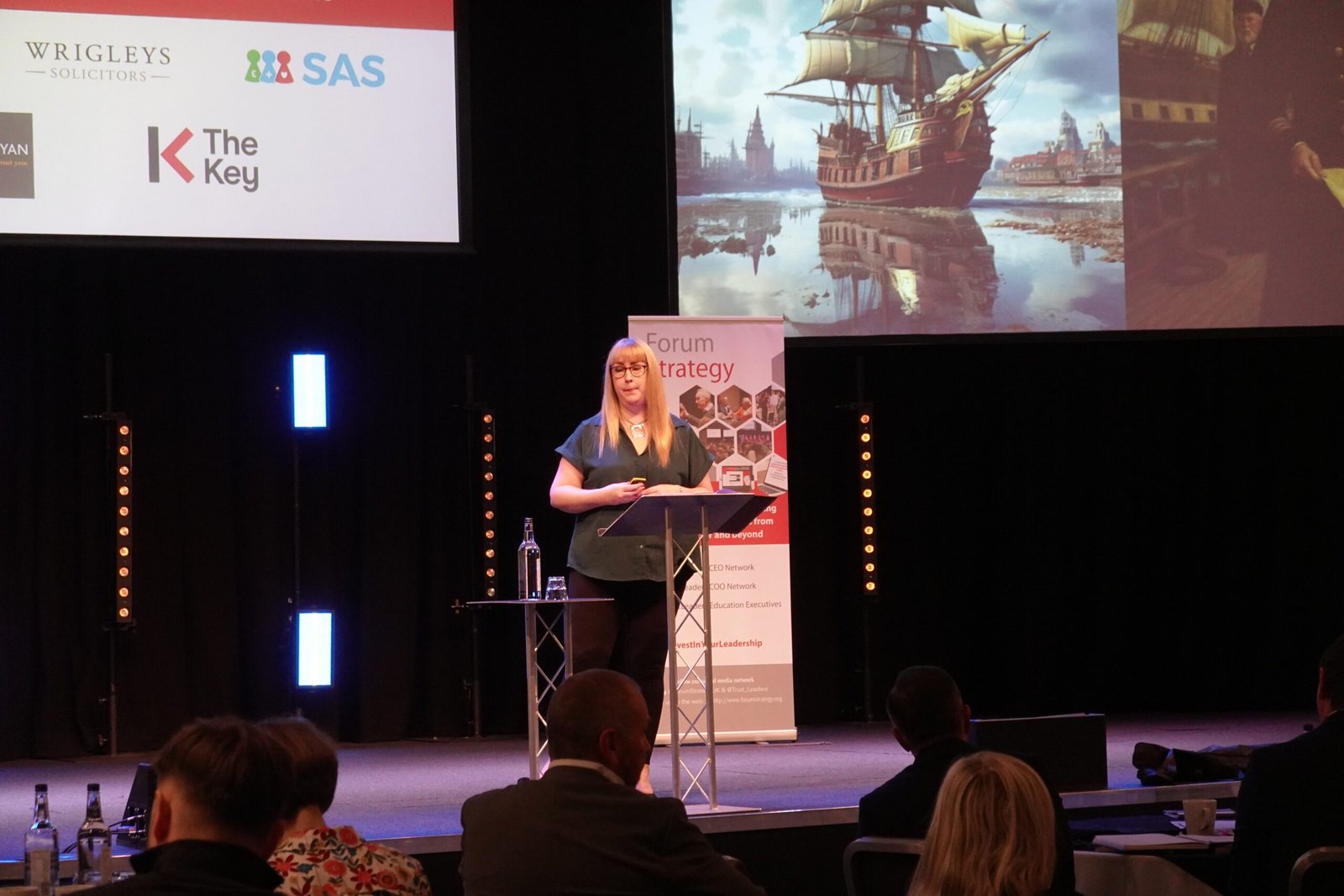
The big shifts across our sector
Colleagues first heard from Forum’s CEO, Alice Gregson, who reflected on the big shifts across the trust sector over the past 11 months. Drawing on a familiar analogy, Alice reflected that the current landscape of trust leadership is very much like captaining a ship through choppy waters and shifting winds. Trust leaders are navigating significant change, and these Forum Strategy symposia provide an opportunity – first of all – to refocus on our purpose and impact as leaders.
Alice reflected on the previous three annual events, each building on the one before to support trust leaders to develop their strategic thinking. At our first event in 2022, Sir Michael Barber cut through the noise with a ‘laser like’ focus on the vital importance of delivery in accomplishing ambitious goals. Next, in 2023, James Plunkett masterfully shifted our gaze to the systemic nature of change. Last year (2024) Steve Munby reminded us, powerfully, that leading change is fundamentally about leading human beings.
These first three symposia, Alice reminded colleagues, provided a powerful framework for the day ahead: the how of execution, the what of our interconnected systems, and the who of leading with humanity.
During the remainder of her speech, Alice spoke not only about what has changed over the past 11 months but also encouraged colleagues to remember the core elements that have stayed constant.
Alice discussed with colleagues the change in government and the resulting policy changes. It was fair to say that many in education were positive and enthusiastic about the change in government and the pre-election support from the now Secretary of State for Education. However, 11 months on and there is still, it seems, no clear vision or narrative coming from the government or the Department for Education regarding the education sector as a whole – and less still about the trust sector’s role within it. Despite this, some positive developments have been made, including the appointment of several experienced and highly credible trust leaders as RISE advisers. She reminded colleagues about the power of system led improvement and direction and that the importance of this, remains steadfast in the face of a level of political vagueness around vision.
Next, on the subject of accountability, Alice outlined that whilst there is much still yet to be seen regarding ‘top down’ measures of accountability; we do know that the new academic year will see colleagues across the education sector working to a new Ofsted framework and approach. There also look likely to be some new approaches from the DfE; and the new RISE teams will have a remit to enable and push forward improvement, particularly in schools that, in government terms, are deemed ‘stuck’. Alice commented that it remains to be seen whether all the proposed changes will be for the better; however, from a trust perspective, a significant part of the accountability picture (and arguably the more important part), is what trust leaders decide to measure as trusts and how they choose to shape their own local level accountability. This is something we call here at Forum Strategy ‘pure accountability’.
“The impact of this for schools and trusts is how you can bring communities back together and build back connection and togetherness. This links to something that has always been important, particularly for trusts… locality and place-based leadership.”
Alice then acknowledged with colleagues the challenging funding landscape for trusts and their schools. There is growing demand for our services, a growing complexity in needs and a range of challenges that require investment. Yet government funding is not keeping up. Indeed, the funding challenge in the sector is probably the most significant challenge that we have as it impacts everything that we do (or can’t do). Alice reflected that education has always needed greater levels of investment but, as leaders, our ability to think creatively and explore how we use funds as effectively and efficiently as possible and how we might generate income from elsewhere remains essential.
Closely linked to the funding crisis, is of course the impact of significant changes and shifts in society as a whole. Alice reflected on the huge changes in people’s mental health, developmental needs, and indeed, attitudes and values. In addition, significant developments in technology and particularly the use of artificial intelligence will inevitably affect how people view and interact with the world, particularly young people. On top of all this, the impact on SEND demand and complexity; behaviour, attendance, safeguarding and engagement in school; curriculum need and relevance; and so many aspects to school life, have created a melting pot of issues and needs that schools and trusts are having to identify, understand and respond to.
Next, Alice discussed with colleagues the final area of ‘big change’ she wanted to touch on – the fragmentation we’ve started to see creeping in, in some communities. Linked to some of the societal shifts we’ve seen over recent months and years, the cracks are beginning to show between communities. The impact of this for schools and trusts is how you can bring communities back together and build back connection and togetherness. This links to something that has always been important, particularly for trusts, and it is locality and place-based leadership. Local identity and affinity to place is so powerful, and great trusts capture this. Alice highlighted that Forum Strategy will soon share a system leadership paper on this exact theme and look forward to building on this with our members.
In conclusion, Alice emphasised that colleagues’ influence, commitment and impact as trust leaders remains as powerful as ever; and the ability to drive improvement from within, as a system, is as important as ever. In addition, the need to keep innovating,
thinking differently and adapting our approaches is as strong as ever. When times are challenging, Forum Strategy and others in the system, can provide a constant ‘port in the storm’. Alice provided a strong message to colleagues to remember that “You are not alone.”
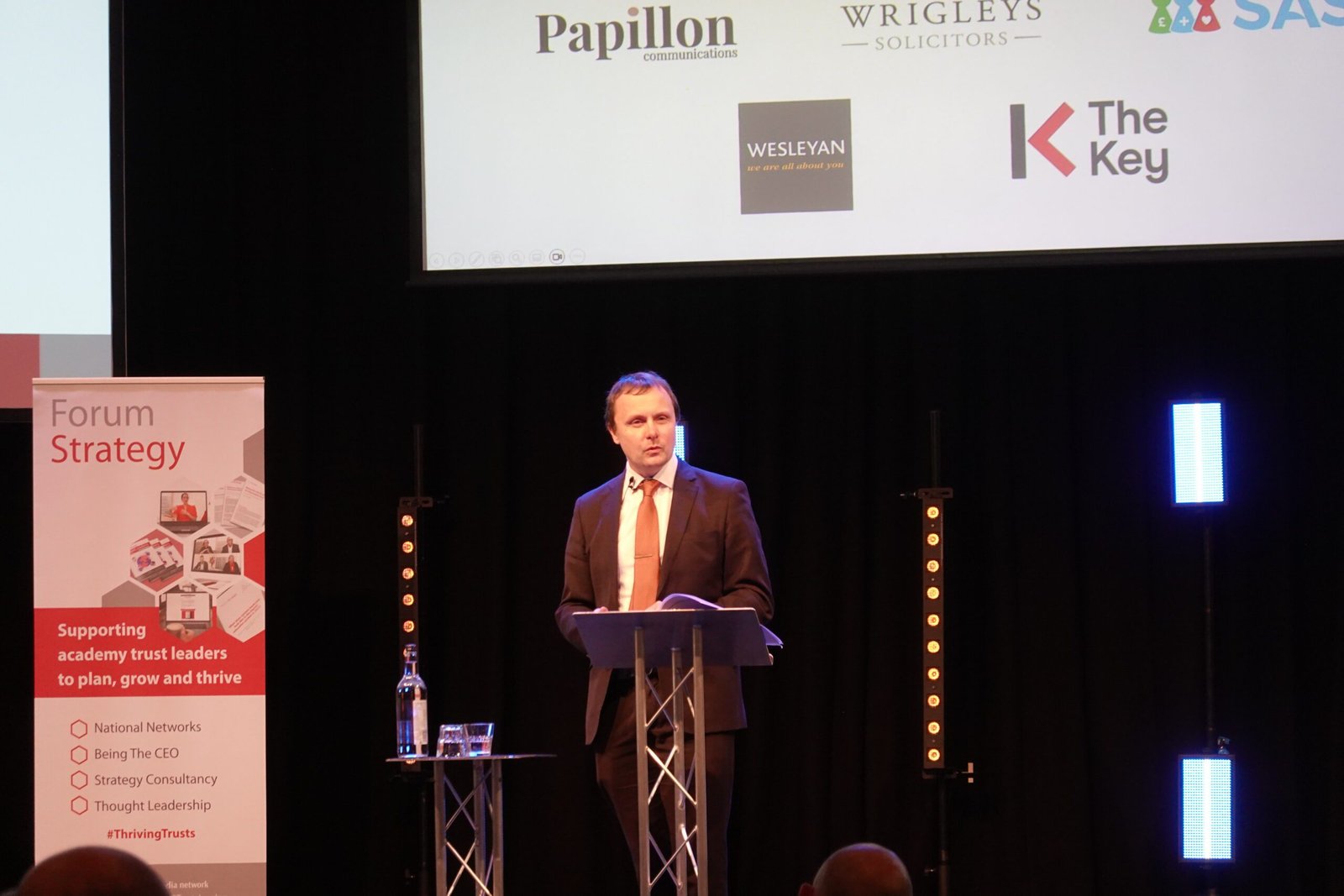
Leading thriving trusts through change
Next, colleagues heard from Forum’s Founder and Chair, Michael Pain, who spoke about leading thriving trusts through a period of flux and uncertainty. He described the story of Kodak – once a familiar sight in every high street, but whose demise was all down to a lack of trust in its own expertise, and to ‘playing it safe’ in an increasingly competitive technological market.
Michael commented that, over the last year, the academy trust sector has – in his opinion – lost just a little of its self-belief. He reflected that mutterings about the rolling back of some academy freedoms began in 2021; something which he wrote about in a Schools Week article ahead of our CEO Conference in September 2021.
Unfortunately, as Alice had also spoken about, the first 11 months of the Labour government seem to be reinforcing this general direction of travel for the trust sector; however, Michael commented that whilst we can’t change much of what the government is doing, the trust system continues to move forward and innovate on some big and profound areas. There is so much expertise now residing within trusts, and many are now leading the way in key areas such as AI, curriculum innovation, SEND, careers development, bridging the social mobility gap, professional development, health and wellbeing, and environmental sustainability.
“For trust leaders, this is about identifying what this generation of pupils needs from us right now to thrive today and tomorrow.”
Next, Michael commented that, whatever changes come to accountability and the national curriculum, trusts will still have the choice to identify and recognise so much of what is needed to prepare this generation of pupils for the world we now live in. He emphasised that the leaders who will approach conventional thinking with a critical eye, and who will set their organisations up to succeed through change will start with their end user. For trust leaders, this is about identifying what this generation of pupils needs from us right now to thrive today and tomorrow. This requires trust leaders to develop their contextual wisdom and make strategic connections.
Michael also proposed the idea of specialist status for trusts, in their areas of expertise, so they can support and inform the wider system in their region. Here, RISE teams and the appointment of trust leaders to some of the RISE adviser positions, will hopefully be helpful. However, a system-led approach will also be needed alongside this – one that sees trusts identified for specialist work and innovation, and to help each other adapt to and seize the opportunities of significant change.
Reflecting on these key points, Michael then asked colleagues to think about the things that are within their circle of control and influence, and those which are beyond their control.
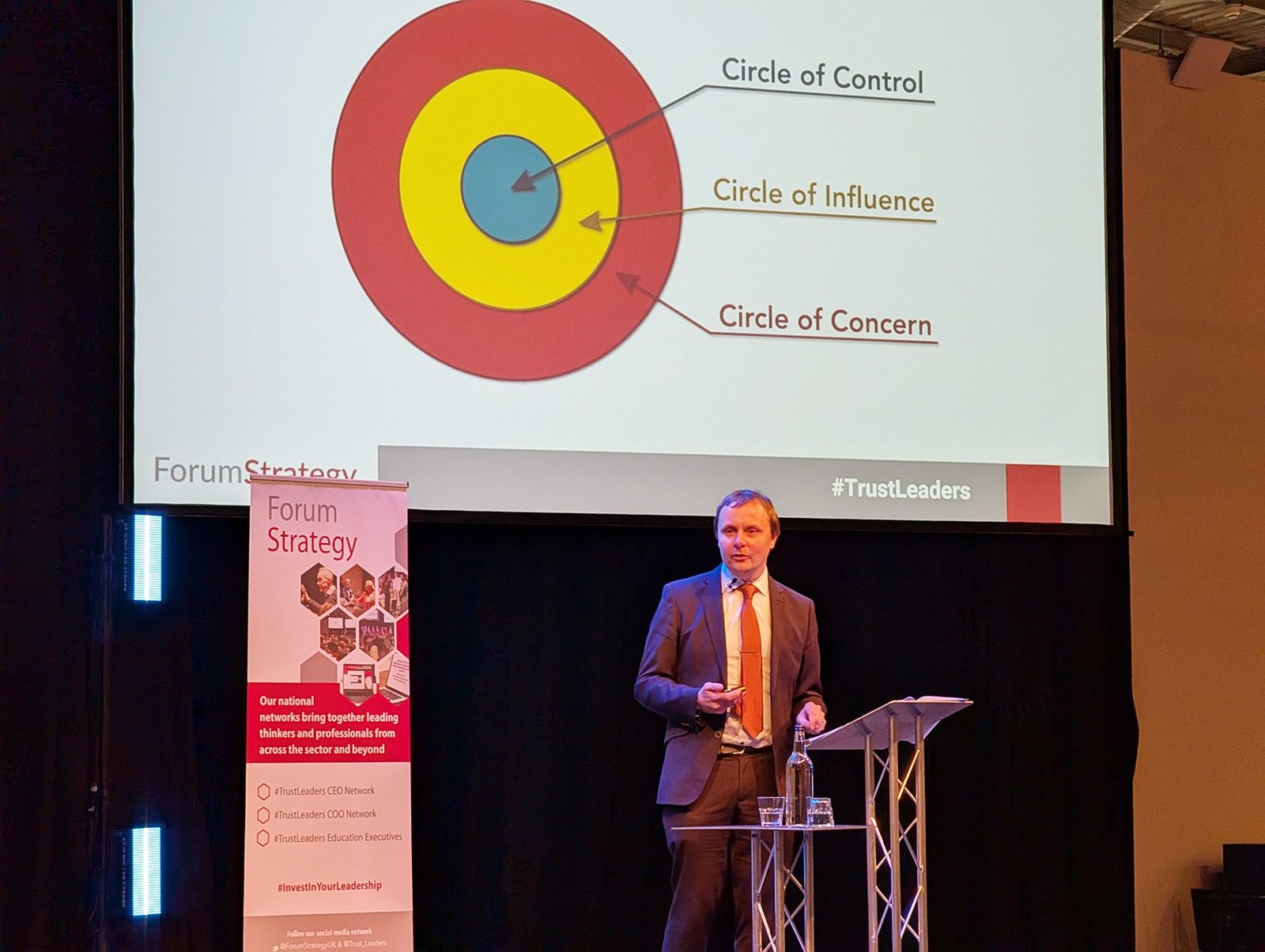
Circles of control and influence
Drawing on the inputs from Alice and Michael, colleagues then spent some time discussing which elements of their work are within their circle of control, those which are in their circle of influence (on which they could work with others to address) and those which are in their circle of concern (that one can only anticipate and adapt to).
Following table discussions, colleagues highlighted the following key points in response to these questions:
- What is within your circle of control and draws on your direct trust experience?
- Keeping the focus on what is needed for our stakeholders and continue to do what is ‘right’ for them – valuing pupil voice within this.
- Understanding and supporting our communities.
- Providing a range of opportunities for our pupils to develop and grow with others.
- Organisational culture, values and strategy; ensuring these stay open, clear and collaborative.
- Professional generosity.
- Using the resources that we have as efficiently and effectively as possible.
- School improvement strategy – including leadership and teacher CPD; clear teaching and learning models; and use of technology.
- Quality of teachers, CPD and pedagogy (acknowledging recruitment issues with some subjects and in some sectors).
- Implementing research-based practices.
- Staff wellbeing and retention.
- Digital classroom access and exposure for pupils.
- Early help and services for families.
- Steering the Trust Board – filtering the ‘noise’.
- What is within your circle of influence and requires partnership and collaboration? Which partnerships will matter?
- Making best use of existing knowledge to innovate for the benefit of our pupils.
- Inclusion agenda – responding and adapting to changing needs.
- Finding the best approaches to address behaviour, disadvantage, and SEND.
- Regional networks of trusts and partnerships, including Local Authority partnerships, which are outward-facing and developmental.
- Attendance – including a focus on particular pupil groups / Relationships with families and addressing barriers to getting children into school.
- Trust Board operation and school governance.
- Working with like-minded individuals and trusts on common collaborative goals.
- Making use of Service Level Agreements within ‘soft’ partnerships.
- Generating income and making best use of available grants, etc.
- What is in the circle of concern – that you can only anticipate and adapt to?
- The current lack of a clear vision from government for education and trusts, and potential constraints on academy and trust freedoms.
- Shifting political landscape and the increasing influence of ‘Reform’ in certain areas.
- Funding overall, capital funding, and SEND funding in particular – complexities and possibilities (what will the White Paper say?)
- Ofsted and accountability.
- Curriculum and assessment – will the new curriculum have sufficient focus on the world of work our pupils will be moving into, plus employability skills?
- Implications of new government initiatives – e.g. breakfast clubs and staff needs; and qualification for school-based nursery provision.
- National supply of teachers.
- Societal attitudes and fragmentation.
- Parental attitudes to school/education
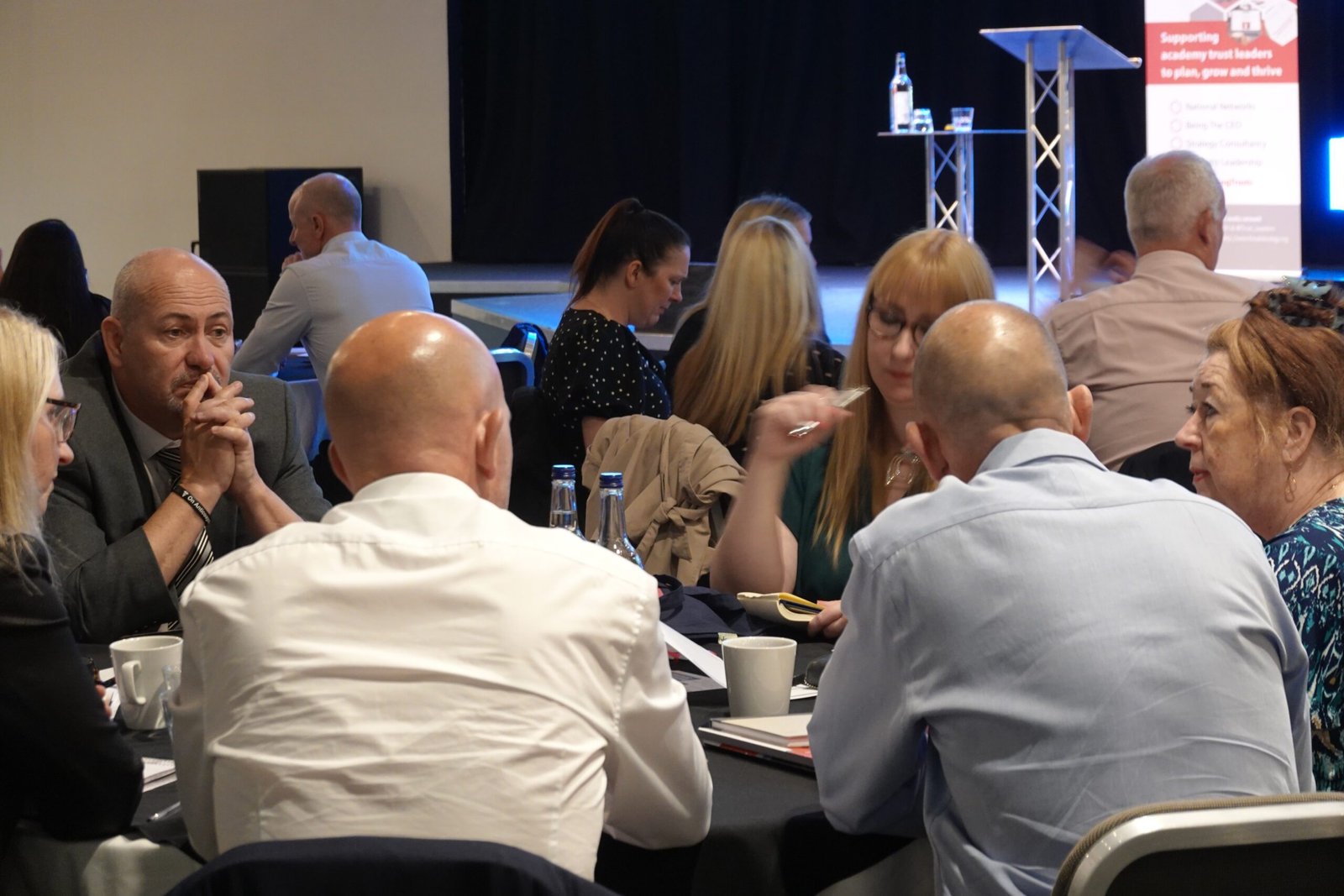
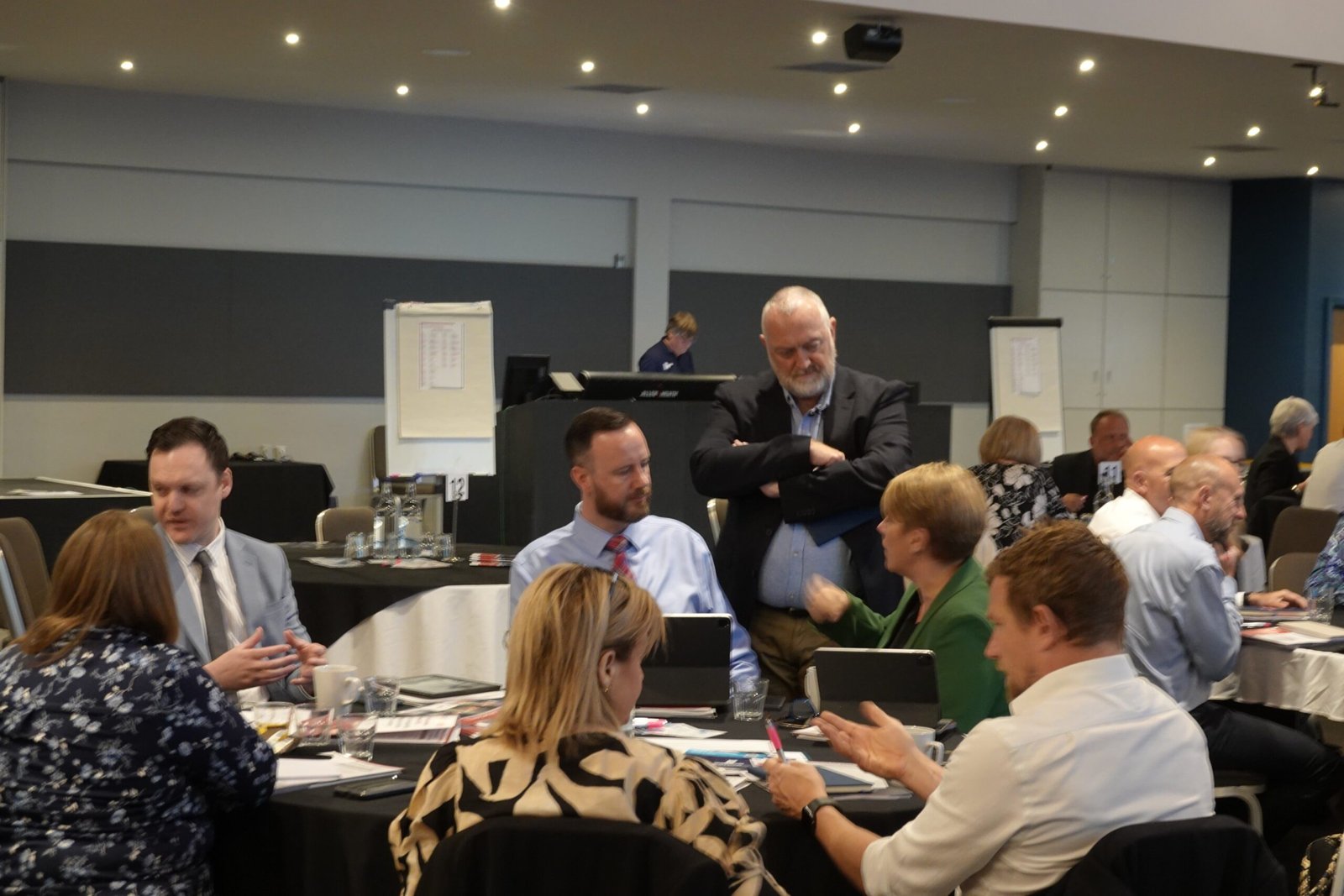
During this discussion, one colleague provided a wonderful summary of the approach trust leaders should be taking, with the following statement:
“It is important to put the emphasis on your circles of control, influence and concern. We can’t let all our concerns get in the way of what we do for our children and young people. They are your circles, and it is within your agency to act.”
Considering this feedback from colleagues, Steve, Alice and Michael gave some initial reflections on what they had heard. The discussions had highlighted the impact of the lack of a clear vision for education from government on the confidence of trust leaders. However, despite this lack of clarity over the ‘what’ in education, trust leaders are clear they have control over the ‘how’ of their work and ensuring they do this in the best interests of their pupils – the moral imperative remains strong across the sector and trust leaders have a clear vision, mission and values within their own organisations. In addition, there is a huge amount of knowledge and expertise residing within the trust sector – including on issues such as social mobility, curriculum, sustainability, and the use of AI in education – it is up to us to shout louder about this and to make best use of our connections and learning opportunities.
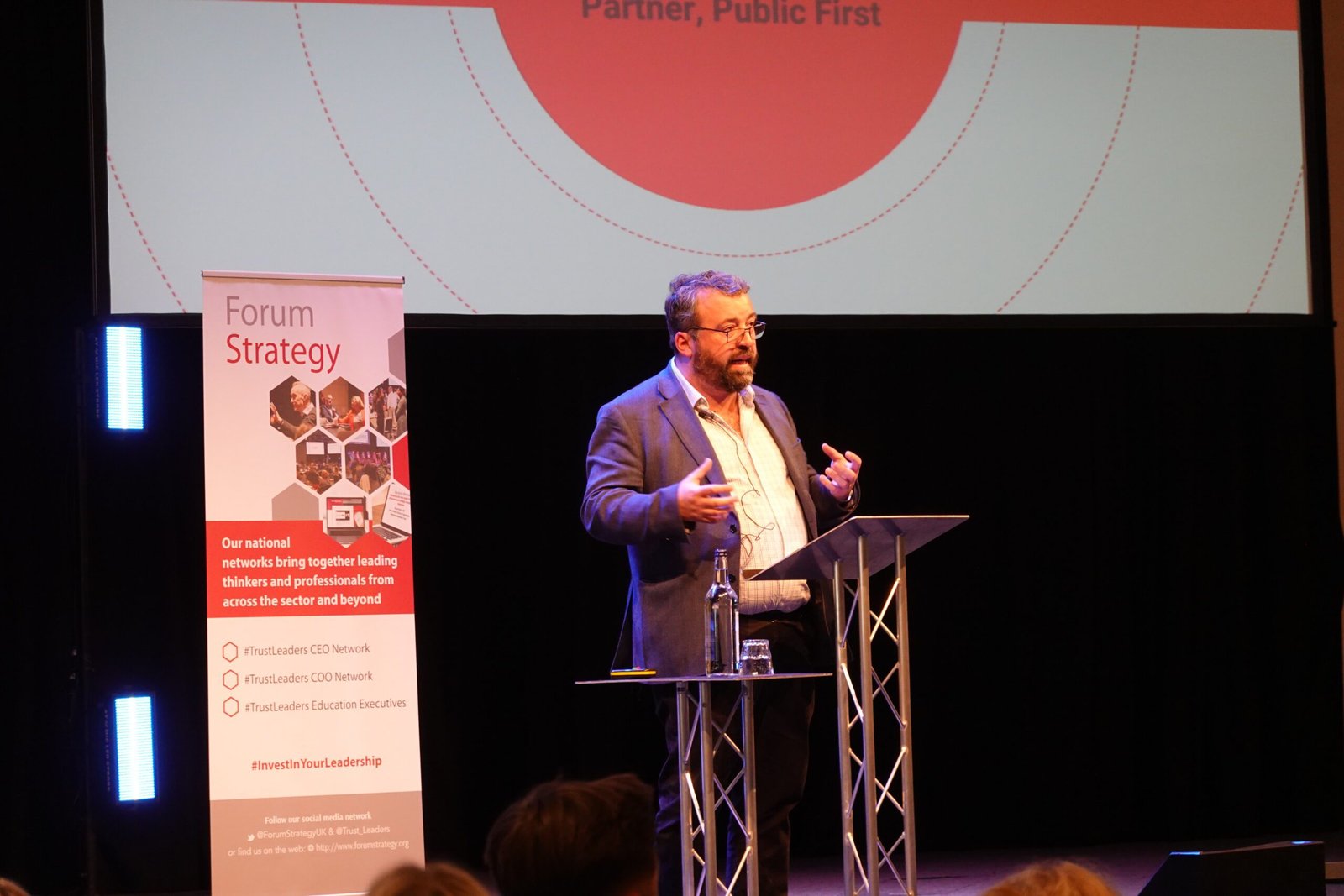
What may come next?
Following lunch, Ed Dorrell spoke candidly with colleagues about the current political landscape for education and for trusts in particular. He emphasised the government’s strong motivation around social justice and social value, and the role of education and a self-improving school system being at the centre of these aims – driving up inclusion and giving every child a strong sense of ‘belonging’ at school.
Ed commented on a number of ways in which the government is drawing on the learning from past successes in education – including from the London Challenge and the work of the best multi-academy trusts – to help it to shape some of its key policy and operational development, such as the introduction of the RISE teams and RISE advisers.
There is recognition from government that the school system overall is currently operating very well, not least in comparison to some other areas of public service. That being said, Ed emphasised the government’s drive to move it from ‘good to great’; recognising the need for greater inclusion and regaining the sense of belonging pupils, parents and communities feel to their local schools.
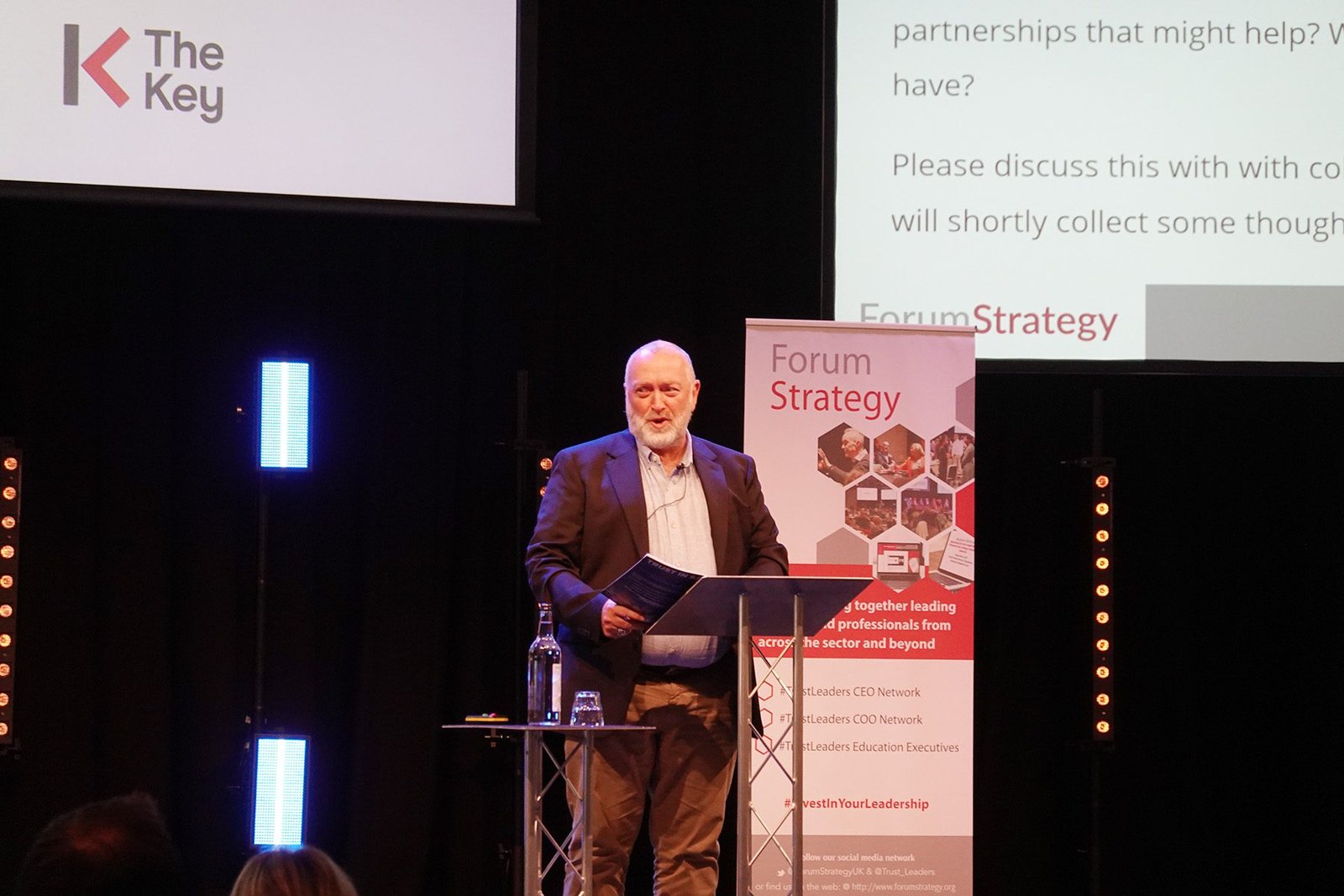
Reflections and key takeaways
Next, Sir Steve Lancashire provided his initial reflections on the day, which he has subsequently expanded on in more detail through his post-Symposium blog (published last week). Steve pulled out some key themes arising from the day, including:
He synthesises four themes from the day
– Redefining relationships; including with government, other trusts and other key stakeholders’, shaping and defining those relationships with a ‘laser like’ focus on how they further our vision and ambitions for this generation of pupils and their communities;
– Re-discovering our confidence where it may have been reduced; there’s a lot of doubt and a lack of clarity which risks leading to some inertia in the system and in our organisations. We need to identify and focus on where we have personal and organisational efficacy. There is such expertise within and across the system; we must be confident – not least through being focused on our priorities, and identifying where we can learn from expertise and learning from each other’s expertise. Progress fundamentally depends on professional generosity.
– Embracing self-care. Within this we also need to embrace the idea that self-care is an act of professionalism. In leading your trust through a turbulent period of change and flux, you need to be performing well. That requires us to look after ourselves and give sufficient focus to our own wellbeing.
– Managing complexity and change is core business. Expand and leverage every strategic network you are in. When policy goes quiet, leadership gets loud. This is a time of opportunity, let’s not wait for all the answers from above, some of which may not come. It’s time to draw on the collective, to be bold and to innovate – together – to ensure this generation of pupils thrive today and tomorrow.
Alice Gregson closed the day by thanking everyone for making the time to attend and to work together during the day; and encouraged colleagues to follow up with each other after the event and keep building on their existing and new connections. Most importantly, Alice reminded colleagues that they are not alone, and to look to each other for professional ideas, personal replenishment, and hope.
Further information and resources relating to the event, including Steve’s blog, and a follow-up article from Michael, can be found at: National #TrustLeaders Symposium 2025 – One year in: navigating the change as trusts and as a sector
